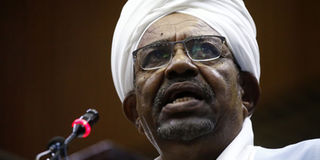Coups are not good for Africa

Mr Omar al-Bashir of Sudan
What you need to know:
- While in many countries, the starting point is citizen protesting, and the military intervening later, in most cases there is no post-regime plan to ensure stability and reform for the better.
In just a space of two years, three African rulers have been kicked out of power in what is clearly a disguised military coup. Of recent, Mr Robert Mugabe of Zimbabwe, Mr Abdelaziz Bouteflika of Algeria, and now Mr Omar al-Bashir of Sudan, have all gone in nearly the same way. Due to their bad rule and their sour relations with the West, the West has either remained silent or given tacit approval to the illegitimate overthrow by the military. The West’s policy towards coups has largely been guided by interests or the attitude towards a given regime.
For instance, when Mr Abdel Fattah el-Sisi deposed the Muslim Brotherhood government of Mohamed Morsi in Egypt, the US and other Western nations gave tacit approval to what was clearly a military overthrow of an elected government because it was associated with the Muslim Brotherhood.
There was no consideration as to whether the new government would be democratic or not. In Zimbabwe, there was bad blood between the Mr Mugabe and Western leaders. His overthrow, no matter the means, was, therefore, a welcome move.
In each of the above cases, the African Union issued statements condemning the illegitimate change of government. However, the AU has been viewed as a league of dictators, who are defending a comrades.
The AU is also to blame for not doing enough to discourage coups. First, it is often willing to dine with beneficiary of coups. Second, it has not done enough to improve democracy on the continent. Third, many AU leaders lack the moral authority to provide the continent leadership.
Despite the shortcomings of the AU, its position on discouraging coups holds water. Encouraging coups either expressly or tacitly will not improve the condition of the African people. It will instead plunge the continent into more conflicts and there is evidence for that.
First, countries that have had coups are no better than they were under the former regime. In both Egypt and Zimbabwe, despite the change in leadership, the living condition of the people have either remained the same or worsened.
Second, the military often take advantage of civilian protests to grab power and continuing with same repression and mismanagement after assuming office. This will most likely be the case in Sudan and Algeria. True change, as demanded by the people, barely materialises, and for both Sudan and Algeria, the situation may culminate into a deeper crisis.
Third, while in many countries, the starting point is citizen protesting, and the military intervening later, in most cases there is no post-regime plan to ensure stability and reform for the better. After the regime has collapsed, the country descends into chaos. The only exception here, albeit in a different case is, Kenya. After the post-election violence of 2007, Kenya drafted a new constitution with a promise of a better country.
So what then is the way forward? The world, especially the West, should be consistent in rejecting coups. Second, the only sustainable system is that based on institutional rule and genuine democracy, where people express their will through free and fair elections.
Denis Birungi,
[email protected]




